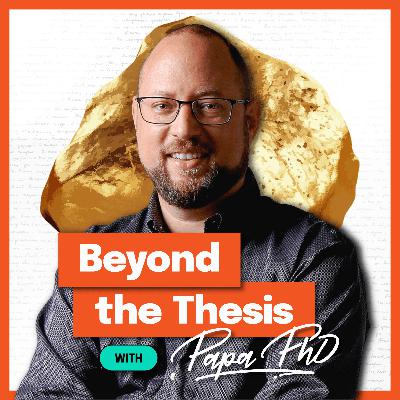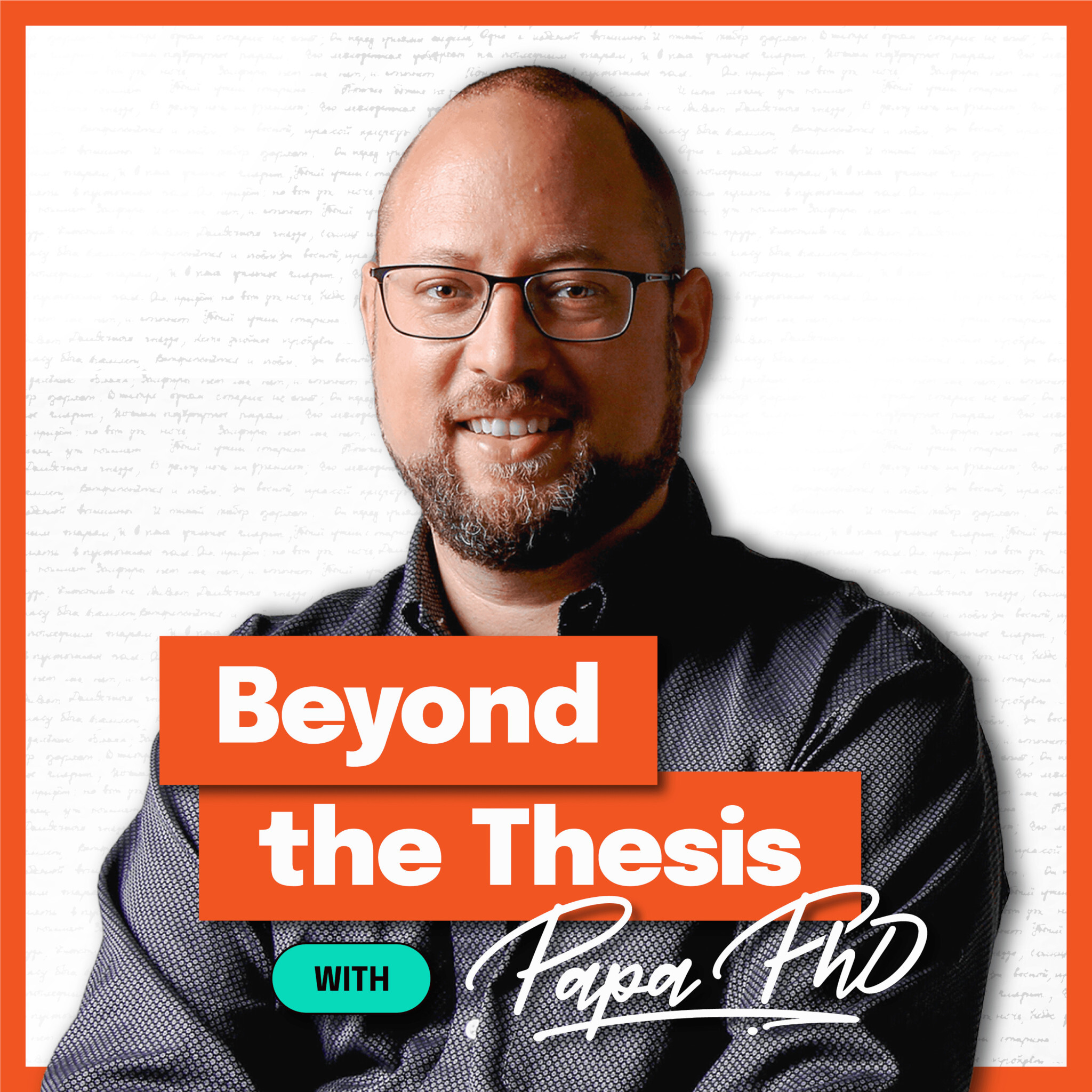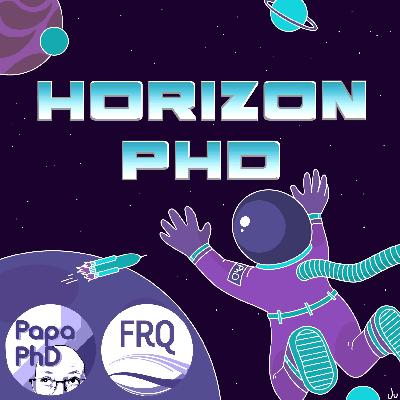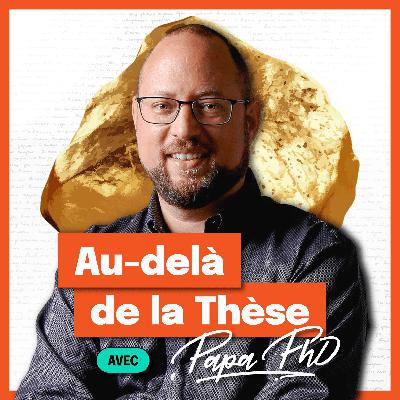Papa PhD Gold: From Bird Brains to Broadcasts - Dr. Kiki Sanford’s Science Communication Journey
Description
Welcome back to Beyond the Thesis! This week, host David Mendes sits down with Dr. Kirsten “Kiki” Sanford, a science communicator with an unconventional path from bird neuroscience to the front lines of science storytelling. In this episode, Dr. Kiki shares behind-the-scenes stories of launching “This Week in Science,” collaborating with mentors like Leo Laporte, and mastering new technologies – much of it self-taught. She reflects on the real-world skills her PhD provided, the power of embracing change, and gives practical advice for anyone looking to turn obstacles into launching pads for new opportunities.
Whether you’re at a crossroads in your career or searching for inspiration to forge your own path, this conversation is packed with actionable insights and fresh perspectives. Tune in and get ready to rethink what’s possible after a PhD!
Kirsten Sanford is a passionate science communicator whose journey began in graduate school, where she studied bird brains and discovered her love for sharing science with others. Today, she juggles multiple roles: producing her own podcasts and telling engaging science stories, running a production company that creates videos and scripts for scientists, and helping to unite fellow science communicators through her work with Science Talk. Through these varied projects, Kirsten is dedicated to making science accessible and exciting for everyone.
Key take-home messages:
Embrace Lifelong Learning: Dr. Kiki taught herself audio/video editing, production tech, and business management. Being open to learning new skills—even outside your academic training—can open new doors in unexpected fields.
Leverage Your Research Skills: Project management, adaptability, and perseverance aren’t just academic buzzwords. These are vital, transferable skills that help you thrive in entrepreneurship and content production.
Build and Nurture Your Network: Attending conferences and connecting with mentors (even outside your original field) led Dr. Sanford to collaborations and opportunities that fueled her passion projects.
If you’re ready to transform setbacks into stepping stones and chart your own unique path, Dr. Kiki Sanford’s journey is a must-listen!
Check out her work at This Week in Science (TWIS) and be inspired by a career that truly goes beyond the thesis.
Connect with Us: Have you thought about pivoting from the bench to broader impact? Would love to hear your stories below!
This episode’s links:
- Dr. Kiki Sanford | Instagram
- This Week In Science | Podcast
- Association of Science Communicators | Website
Episode Transcript
David Mendes:
Are you struggling to find your path to pivot from academia to entrepreneurship? On this new episode of Papa Ph.D. gold, Dr. Kiki Sanford shares the details of her journey from neurophysiology research to science communication. She opens up about the twists, challenges, and breakthroughs of building a fulfilling career on her own terms. So if you’re ready to transform setbacks into stepping stones and to craft your own unique path, listen now to get inspired and take action. Welcome to beyond the thesis with Papa PhD. Your weekly inspiration for post PhD career development with me, David Mendez. What steps brought you from your PhD to TWIS, to This Week in Science?
Kirsten Sanford:
After my PhD, I finished and I was like, okay, this is what I’m doing now. I’m going to be a science communicator. I’m going to try and re. And this is before science communicator was really even a term or a word. It was like this nascent idea. People were starting to use it, but it wasn’t really adopted yet. I remember going, what am I? Who am I? How do I describe myself to people? And yeah, thank goodness Science Communicator has grabbed a hold. But what I started doing is I started going to conferences and networking and trying to meet a larger community of people doing a similar thing. So podcasting. I no longer going to the science conferences, the research conferences so much. I started going to the podcasting conferences and doing the podcasting conferences. I started meeting a whole bunch of people in that field. And again, with mentors being so important, I met a guy named Alex Lindsey, and he worked on a podcast called this Week in Tech. And so I was at this podcasting conference and I saw his name tag with his podcast name, and I went up to him and I said, hey, you’re this Week in Tech. I’m this Week in Science. And he said, hey. And we started talking. And that led to a collaboration, doing a video program. And this is right at the beginning of itunes starting to offer video podcasts. It wasn’t even YouTube, wasn’t even a huge deal yet. And we did a series called Food Science. And I, we created 14 videos related to various aspects of food science. It was super fun. And along that way, I. That was again, getting to use my, you know, my video production skills. I was writing scripts, I was doing the hosting. So I learned how to do more on camera work through that.
David Mendes:
Okay.
Kirsten Sanford:
And in that effort, he introduced me to the host of and the founder of this Week in Tech, Leo Laporte. And Leo Laporte. Then this is kind of step by step, Leo laporte said, hey, do you want to come do some stuff with Twit? And said, hey, that’d be great. And so I started doing some work with this Week in tech, commentating on certain things, doing a little bit more tech reporting instead of specifically Science. So TWIS was a podcast. We were still at KBBS doing the radio show. That’s it. So, but I, because I had finished, I moved back to San Francisco. I was no longer. So I kind of bounced back and forth between Davis and San Francisco. And I was like, okay, we got to keep TWIS going. The podcast format is amazing. I love live radio. I love live. How can we keep that happening? And so, because I had met Leo, he was doing live streaming on his TWIT video network. And I asked him if we could use his network to broadcast this week in Science.And so that’s. We made the move from live on KDBS Davis to live on twit. And we became a video stream, a live video program. And I’d take the audio and then I would send the audio to KDBS and I would put the audio up as a podcast. And so we started distributing in these different ways. You know, I kept working on different video shows and then expanded my work on the TWIT network. And I started doing an interview program called Dr. Kiki Science Hour, which I did about a hundred episodes, just over a hundred episodes, I believe. And TWIS was going the whole time. And then at a certain point, TWIT was expanding, but then they decided they really needed to. They needed to pare themselves down. And so they got rid of all third party produced programs, which meant TWIS had to find a new home, we had to find a new platform. Google Hangouts was just becoming a thing. We took advantage of Google Hangouts and started broadcasting TWIS to YouTube live.
David Mendes:
Live to YouTube.
Kirsten Sanford:
And then this summer, Google Hangouts went away and we found a new platform. And now we are using a platform called Streamyard to broadcast to YouTube. But we have visions now of expanding to Twitch. And I’m. Yeah, we, we. I’m trying to develop the funding model to be able to expand the number of programs that we offer. And that’s where I am right now, because I want to go back to doing more interview shows. So now I’m looking outward at doing more. More production myself and expanding TWIS. But TWIS just did our 740th estimated podcast episode. I mean, yeah, in terms, that’s estimating that we started officially podcasting on iTunes in 2005, basing it on about 50 episodes a year, our estimate of about where we are, we can hit 800 next year. Yeah, and we’re super excited about that. But I mean, in reality we’ve been like, you know, pretty much nonstop since 99, 2000, so it’s huge.
David Mendes:
And like now you’ve, you know, you’ve, you’re telling me your story and I’m just, you know, starting to get this, this picture of how much you’ve had to learn in this because you know, in this domain of producing content, of dealing with distribution platforms, how did you go about, did you, are you self taught in all of this? Were there like apart from the AAS program that you fellowship? Yeah, yeah, the mass media fellowship. Apart from that, was there other training that you felt was necessary that you get to be able to step it up in terms of, you know, taking grasp of these technologies or how did you go about getting this?
Kirsten Sanford:
Yeah, so all of it. I am self taught. I have paid attention to people. So all of the editors I’ve ever worked with, I watched them as they were editing. I paid attention to what they were doing and asked questions as we were setting up cameras and lights to do the shoot. Even though I wasn’t the camera person or the lighting person or the sound person, I paid attention and I asked questions. Every time I’ve done something, I try to be involved and engaged in what I’m doing and not just. I’ve really tried to not just be focused on my one little part of a project, to pay attention to how it fits in with the other aspects of the project as a whole. And so in doing that, now, you know, I’ve self taught. I’m not the best editor, but I have been editing my own audio for years. I edit video now. I can work as the production tech, I can set up the sound and I can make a recording. I can be a single individual going out, recording an interview, come back, edit it and put out a final pro








